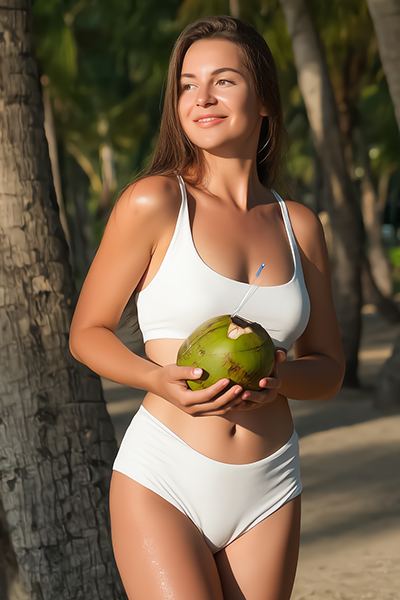No products in the cart.: $0.00
Cetearyl Alcohol

Cetearyl alcohol is a fatty alcohol used in skincare and cosmetics as an emollient, emulsifier, thickener, and stabilizer. It’s a blend of cetyl alcohol (C16) and stearyl alcohol (C18), combining their properties to create smooth, creamy textures in products like lotions, creams, and conditioners. It softens skin, stabilizes emulsions, and enhances product spreadability without the drying effects of typical alcohols (e.g., ethanol).
What is it Made of?
Cetearyl alcohol is derived from:
-
- Vegetable Sources: Primarily coconut oil or palm oil, where fatty acids (palmitic and stearic acids) are reduced to alcohols.
- Synthetic Sources: Rarely, it may come from petroleum-based compounds. Its composition includes:
- Cetyl Alcohol (C16H34O): A shorter-chain fatty alcohol for lightweight emollience and emulsification.
- Stearyl Alcohol (C18H38O): A longer-chain fatty alcohol for added thickness and occlusion.
- Carbon and Hydrogen Chains with Hydroxyl Groups: Enable moisturizing and water-oil binding properties.
-
It’s typically plant-based, making it suitable for vegan and eco-friendly formulations.
Best Skin Type for Using It:
As an ingredient in skincare products, cetearyl alcohol’s suitability depends on the formulation, but it’s generally well-tolerated by:
-
- All Skin Types: Cetearyl Alcohol is generally considered suitable for all skin types, including:
-
- Dry Skin: Its emollient properties help lock in moisture, making it excellent for hydration and reducing the appearance of dry, flaky skin.
- Normal Skin: Provides a smooth, non-greasy finish, enhancing the feel of skincare products.
- Oily/Acne-Prone Skin: When formulated correctly, it can be part of non-comedogenic products, helping to control oil without adding excess greasiness.
- Sensitive Skin: Typically well-tolerated, offering hydration without causing irritation, though individuals should always do a patch test if they have sensitive skin.
- Combination Skin: Can help in balancing skin by providing hydration where needed without exacerbating oiliness in other areas.
- Acne-Prone Skin: While generally non-comedogenic, cetearyl alcohol’s suitability depends on the overall formulation. It should be used in products specifically designed for acne-prone skin, where other ingredients counteract potential comedogenicity.
- Mature Skin: Beneficial in anti-aging products due to its moisturizing effects, which help in reducing the visibility of fine lines by maintaining skin hydration.
-
- All Skin Types: Cetearyl Alcohol is generally considered suitable for all skin types, including:
Benefits of Cetearyl Alcohol
-
- Moisturization: Acts as an emollient, softening skin and preventing moisture loss by forming a light protective barrier.
- Emulsification: Stabilizes oil-in-water emulsions, ensuring smooth, consistent textures in creams and lotions.
- Thickening: Enhances product viscosity, improving application and sensory feel.
- Skin Conditioning: Leaves skin smooth and supple without greasiness.
- Non-Irritating: Gentle and safe for sensitive skin, with minimal risk of sensitization.
Pros and Cons of Cetearyl Alcohol
Pros:
-
- Plant-derived (often coconut or palm), biodegradable, and suitable for eco-friendly and vegan products.
- Gentle and non-irritating, safe for most skin types, including sensitive.
- Improves product texture, making creams and lotions luxurious and easy to apply.
- Supports hydration and skin barrier function in moisturizing formulations.
- Widely approved for cosmetic use (e.g., FDA, CIR, COSMOS-certified).
Cons:
-
- Not an Active Ingredient: Lacks therapeutic benefits (e.g., antioxidants, vitamins) compared to rosehip oil or shea butter.
- Mildly Comedogenic: May clog pores in heavy formulations for acne-prone or oily skin.
- Source Concerns: Palm oil-derived cetearyl alcohol may contribute to deforestation unless sustainably sourced (e.g., RSPO-certified).
- Allergic Potential: Rare, but some may experience sensitivity to fatty alcohols.
- Limited Sensory Benefits: Doesn’t provide the nutrient-rich feel of natural oils or butters.
Cetearyl alcohol is a gentle, non-drying ingredient made from coconut or palm oil that functions as an emollient, emulsifier, and thickener in creams, lotions, and conditioners. Suitable for most skin types, it enhances product texture and moisture retention while being well-tolerated even by sensitive skin.
Disclaimer:
The information in this blog post is for educational purposes only and is not a substitute for professional medical or dermatological advice. Always consult a qualified dermatologist or healthcare provider before using products containing cetearyl alcohol, especially if you have sensitive, acne-prone, or allergy-prone skin, are pregnant, or have pre-existing skin conditions. Individual results may vary, and some users may experience rare allergic reactions or breakouts, particularly with heavy formulations. Patch testing is recommended before use, especially for sensitive or acne-prone skin. The author is not liable for any adverse effects resulting from the use of cetearyl alcohol-based products based on this information. Claims are based on peer-reviewed scientific research and industry data, but the efficacy of cetearyl alcohol can vary depending on formulation, concentration, and individual skin type.



